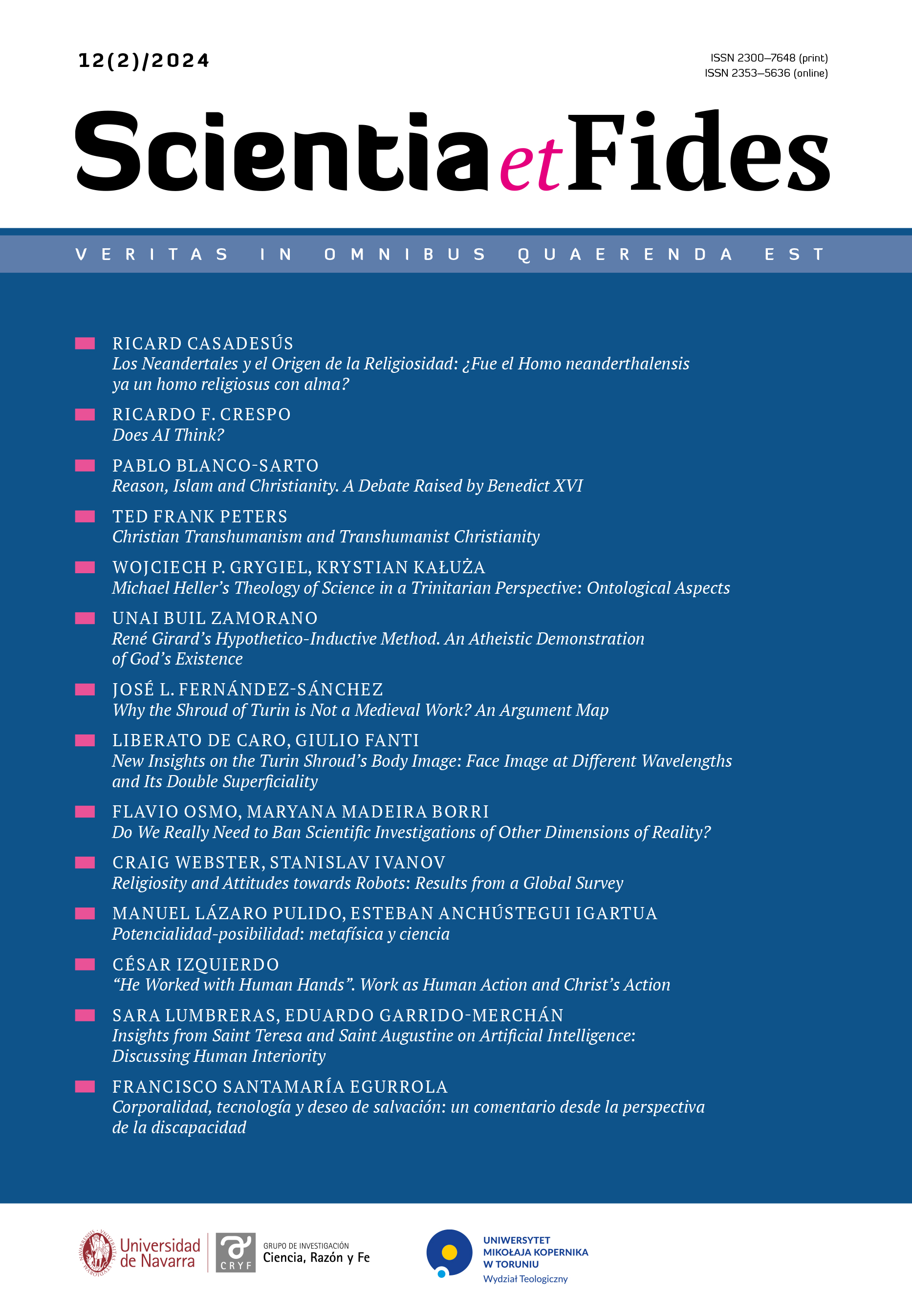“He Worked with Human Hands”. Work as Human Action and Christ’s Action
DOI:
https://doi.org/10.12775/SetF.2024.024Keywords
labor, sense of life, action, mediation, pro-existenceAbstract
The complexity of work in our time presents new challenges for a theology that understands this fundamental dimension of existence and gives it an integrating, truly human meaning and a path to holiness. In order to embrace all modern forms of work, a definition of work is proposed as an action that involves the whole person and leads to fulfilment through work. Not only is work not a punishment, but the punishment would be not to be able to work. In work there is a convergence between nature and spirit. In order for the relationship between them to be harmoniously realised, a mediation is necessary that can only be exercised by man in which both meet. This avoids the risk of materialism and spiritualism in the understanding of work. But this mediation is limited to "this" concrete work. In order for there to be a mediation that includes all work, a Mediator is necessary, and that Mediator is Christ. The work that Jesus of Nazareth carried out was an exercise of his pro-existence and was therefore redemptive and salvific. It is in union with Christ that human work finds its ultimate meaning and transcendent efficacy.
References
Benedict XVI. 2006. Homily. https://www.vatican.va/content/benedict-xvi/en/homilies/2006/documents/hf_ben-xvi_hom_20060413_messa-crismale.html
Blondel, Maurice. 1893. L’action. Essai d’une critique de la vie et d’une science de la pratique. Paris: Alcan.
Borne, Étienne, and François Henry. 1944. El trabajo y el hombre. Buenos Aires: Desclée de Brouwer.
Comisión Teológica Internacional (CTI). 1983. Documentos 1970–1979. Madrid: Cete.
Chenu, Marie-Dominique. 1955. Pour une théologie du travail, Paris: Editions du Seuil.
Chevrot, George. 1939. La vie de l’homme nouveau, Paris: Desclée de Brouwer.
Clavier, Henri. 1944. Le Christianisme et le travail. Clermont-Ferrand-Valence: Impr. Réunies.
De Rougemont, Denis. 1972. Penser avec les mains, Paris: Gallimard.
Delhaye, Philippe. 1957. “Théologie du travail.” L’Ami du Clergé 67: 432–5; 4 49–55.
Escrivá, Josemaría. 1985. Christ is passing by. New York: Scepter.
Granada, Daniel. 202. “Consideración unitaria del trabajo como acción en la historia de la teología del trabajo.” Scripta Theologica 56: 377–406.
Guitián, Gregorio and Ana Marta – González. 2022. “Theology of Work: New Perspectives.” Scripta Theologica 54: 757–87.
Izquierdo, César. 2017. “El Mediador, una clave para la teología.” Scripta Theologica 49: 351–70.
Izquierdo, César. 2017. El Mediador, Cristo Jesús. Madrid: Biblioteca de Autores Cristianos.
Izquierdo, César. 2021. “Cristo mediador en el II concilio de Constantinopla.” Scripta Theologica 53: 459–82.
Juan Pablo II. 1981. Enc. Laborem exercens. https://www.vatican.va/content/johnpaul-ii/es/encyclicals/documents/hf_jp-ii_enc_14091981_laborem-exercens.html.
Posadas, Jeremy. 2017. “The refusal of work in Christian ethics and theology. Interpreting work from an anti-work perspective.” Journal of religious studies 45: 330–61.
Ratzinger, Josef. 1971. Introducción al cristianismo. Salamanca: Sígueme.
Rondet, Henri. 1955. “Eléments pour una Théologie du travail.” Nouvelle Revue Théologique 77: 24–48.
Ruyer, Raymond. 1948. “Métaphysique du travail.” Revue de Métaphysique et de Morale 53: 190–215.
Todolí, José. 1952. “Teología del trabajo.” Revista Española de Teología 12: 559–79.
Volf, Miroslav. 2018. “Work as cooperation with God.” In Work. Theological foundations and practical implications, edited by en Loftin, R. Keith and Trey Dimsdale, 83–109. London: SCM Press.
Vveinhardt, Jolita, and Mykolas Deikus. 2023. “Strategies for a Nonviolent Response to Perpetrator Actions: What Can Christianity Offer to Targets of Workplace Mobbing?” Scientia et Fides 11(2): 175–95. DOI: https://doi.org/10.12775/SetF.2023.021.
Downloads
Published
How to Cite
Issue
Section
License
Copyright (c) 2024 Cesar Izquierdo

This work is licensed under a Creative Commons Attribution-NoDerivatives 4.0 International License.
CC BY ND 4.0. The Creator/Contributor is the Licensor, who grants the Licensee a non-exclusive license to use the Work on the fields indicated in the License Agreement.
- The Licensor grants the Licensee a non-exclusive license to use the Work/related rights item specified in § 1 within the following fields: a) recording of Work/related rights item; b) reproduction (multiplication) of Work/related rights item in print and digital technology (e-book, audiobook); c) placing the copies of the multiplied Work/related rights item on the market; d) entering the Work/related rights item to computer memory; e) distribution of the work in electronic version in the open access form on the basis of Creative Commons license (CC BY-ND 3.0) via the digital platform of the Nicolaus Copernicus University Press and file repository of the Nicolaus Copernicus University.
- Usage of the recorded Work by the Licensee within the above fields is not restricted by time, numbers or territory.
- The Licensor grants the license for the Work/related rights item to the Licensee free of charge and for an unspecified period of time.
FULL TEXT License Agreement
Stats
Number of views and downloads: 338
Number of citations: 0



